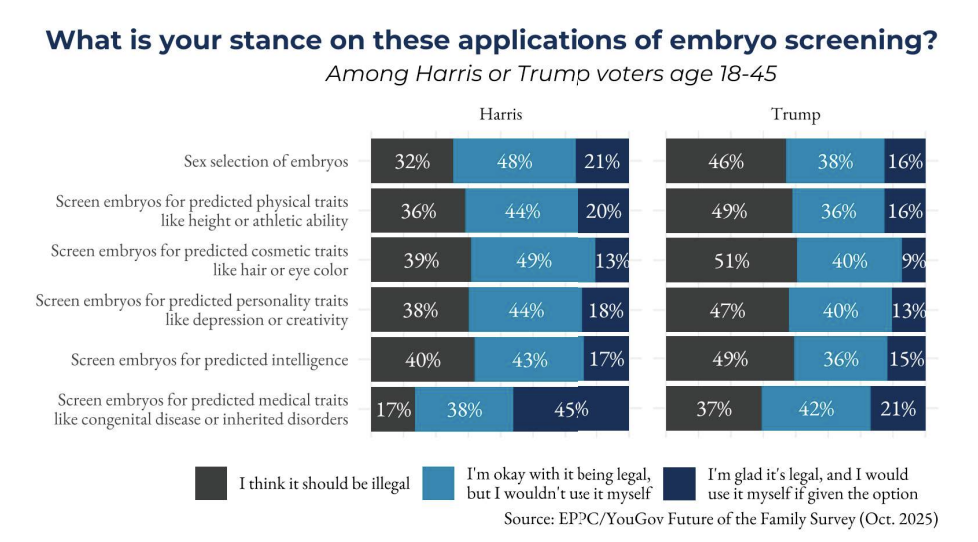It’s no secret that polls often overstate Americans’ support for in vitro fertilization (IVF) by preying on their ignorance about the mass destruction of embryos. A new survey from the Ethics and Public Policy Center and YouGov, however, found that Americans’ concerns about unregulated reproductive technology, such as IVF, are far more widespread when questions center on the morally and ethically contentious practice of screening embryos for those traits deemed less desirable.
According to the results of the November 2025 Future of the Family Survey, four out of five of the 1,100 18-to-45-year-olds polled had “at least a little concern about genetic screening of embryos.”

Overall, women showed slightly more concern about the genetic testing of embryos than men. Older women, approximately 83 percent of females 46 years and over, showed the most concern about “allowing parents to choose their embryo’s characteristics, like eye color, IQ, or athletic ability.”
Because IVF is so expensive and risky, fertility specialists often tout genetic testing as standard practice for embryos produced in a lab. Research, however, shows that one of the most common embryo screening regimens, PGT-A, does not increase the likelihood of a healthy pregnancy or baby. Instead, it gives parents an excuse to discard or indefinitely freeze embryos that receive a “less than” grade. Already, 93 to 97 percent of test tube babies will not make it to birth or even a womb.
It is illegal in several states to abort unborn babies who receive a prenatal chromosomal abnormality diagnosis. IVF biotech startups “backed by billions of dollars,” such as Orchid and Nucleus, however, sell a process for culling embryos, testing them for potential diseases, disorders, cancers, defects, and chromosomal abnormalities without legal repercussions.
They claim ranking embryonic life and discarding the little lives that don’t make the cut is a “positive moral choice” that “prevent[s] … diseases.” Their quest is boosted by leading fertility industry activists such as the American Society for Reproductive Medicine, which hails such polygenic screenings as an “exciting” addition to the array of genetic tests IVF clients can use to determine which of their embryos gets a chance at life outside of a cryopreservation tank.
This technology, the EPPC brief notes, is “still unproven.” Yet its widespread use could further commodify children created with reproductive technology.
“This would radically change the nature of parenthood, turning would-be parents from recipients of the gift of a new child to consumers looking for a product made to order,” the brief continues. “It would undermine social support and research funding into diseases that would have otherwise been screened out, casting parents who have children naturally as taking an unacceptable risk.”
An Appetite for Change
Despite moral, ethical, and functional questions about IVF, President Donald Trump has repeatedly promised to “increase access” to the reproductive technology “to make it easier for all couples to have babies, raise children, and start the families they’ve always dreamed about.”

A majority of Trump’s voters, however, think embryo screening for sex selection, physical traits, cosmetic traits, personality traits, and projected intelligence should be outlawed. Only when it comes to screening embryos for “predicted medical traits like congenital disease or inherited disorders” did the number of Trump 2024 voters who claimed they were “okay with being legal, but I wouldn’t use it myself” outpace those who said the practice “should be illegal.”
Even then, 37 percent of MAGA supporters still expressed the desire to ban health-prediction embryo screening. Only 21 percent of Trump voters said they were “glad” such screenings existed and claimed they would “use it myself if given the option,” compared to the 45 percent of Kamala Harris voters who said the same.
Overall, most adults who cast their votes for Kamala Harris in the 2024 presidential election said they were okay with embryo screening across the other categories being legal, but agreed, “I wouldn’t use it myself.”

While the total number of adults willing to utilize genetic embryo testing remained a minority, the EPPC brief about the survey data warned “that share is likely to grow over time if these tools are culturally normalized and achieve economies of scale.”
Jordan Boyd is a staff writer at The Federalist and producer of The Federalist Radio Hour. Her work has also been featured in The Daily Wire, Fox News, and RealClearPolitics. Jordan graduated from Baylor University where she majored in political science and minored in journalism. Follow her on X @jordanboydtx.

















